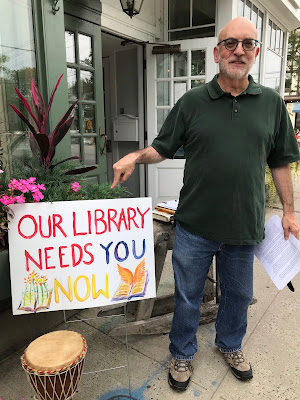My home state of Texas has been in the news lately, roiled by politics, school massacres, border crossings, abortion and other issues. This story gives you a sense of what I experienced on social issues growing up there in the 1960s and 1970s.
In June 1975, my high school sent me to the “Citizenship Seminar” organized
by Civitan International, a service organization. It was at LeTourneau College
(now University) in Longview, Texas, 560 miles from my boyhood home in Mission,
on the Mexican border. A girl from my class at Mission High School also
attended, and she played a key role in my seminar experiences.
Re-reading my teen journal entries, I was struck by how Civitan
intersected with my growing sense of Jewish identity. Speakers at Civitan
forced me to take a stand – literally. Hand in the air, “Yes, I am one of THOSE
people.”
Some context sets the tone for Civitan. I saved the seminar’s
program. Its back page included the Civitan Creed, which included this
declaration: “My Creed was proclaimed by the Man of Galilee when He declared,
‘Whatsoever ye would that men should do to you, do ye even to them.’” So that
points to a perspective perfectly aligned with the Christian nature of LeTorneau. I would not be getting official exposure to alternative views.
The program was distilled 100 proof Texas conservative thinking.
I wrote about a “stormy meeting” with Norma Gabler, part of a husband-and-wife
team with her husband Mel. They successfully pressured publishers of textbooks sold in Texas and elsewhere to alter
their subversive, anti-American content. I wrote,
“The session evolved into a shouting match on whether George
Washington had VD. That had to do with the accuracy of history books. Then she
moved on to a discussion of evolution and creation in science texts.”
 |
| Mel and Norma Gabler making a point with large numbers, something about evolution? |
“After dinner, we “rapped” about topics like foreign aid, capital punishment and prostitution. I spoke about capital punishment twice. A girl nicknamed Bunny quoted, “Thou shalt not kill.” I later said that was a mistranslation [of Jewish texts]. Bunny countered with, “Well, I know you’re a Jew,” and I felt startled. I asked her how she knew that and she said my classmate from Mission told her I was.”
 |
| Clay Smothers. |
Smothers’ comments about school busing drew a dissent from Martin
from Dallas, a friend I made that week (proof that the concept of "Jewdar" works even if I didn't know why). I described Martin as “definitely
liberal.” Martin later heard my tense exchange with Bunny, and asked me if I
was Jewish, and I said yes. I wrote:
“He said, ‘After what the girl said in the meeting last
night, I figured you were.’”
Martin had an obviously Jewish last name, some version of
Silver. We skipped activities to talk about Jews, Israel and school.
Another speaker was Kurt Swanda from Fort Worth. His topic: “Of All the Countries, Why America.” I wrote that Swanda was “alternately a
prisoner and soldier of and in both" the Wehrmacht and Red Army in World War II. Besides telling gory details about what he saw, Swanda asserted the
Russians were way more bestial than the Germans.
Warming to the topic, he shifted gears.
“Any Hebrews, any Jewish People in here?” he asked in his
eastern European accent. Hmmm. The Moment of Truth. I timidly raised my hand,
knowing with Martin not at that session I’d be the only Jew present. The seminar
director noticed and said, “Hey, there’s one back here.” I raised my hand all
the way up. Nothing else to do. He asked me if I knew anything about the
ghettos. Yes, I said. A little.”
A year later I left for Princeton and rarely
returned home except for family visits and high school reunions. Forty-seven years later, Texans still argue about textbooks and rights
and abortion and borders and subversive infiltration and who's the liberal and who's the conservative, and so much more. Gabler, Smothers and Swanda have all died. LeTourneau brands itself as "the Christian polytechnic university."
I wonder if Martin from Dallas remembers our conversations. I
had never been able to talk so openly with another Jewish teen about the issues
roiling my life. The intensity of our brief connection remains with me. And what about Bunny, who called me out for being Jewish? I never forgot her, either.















